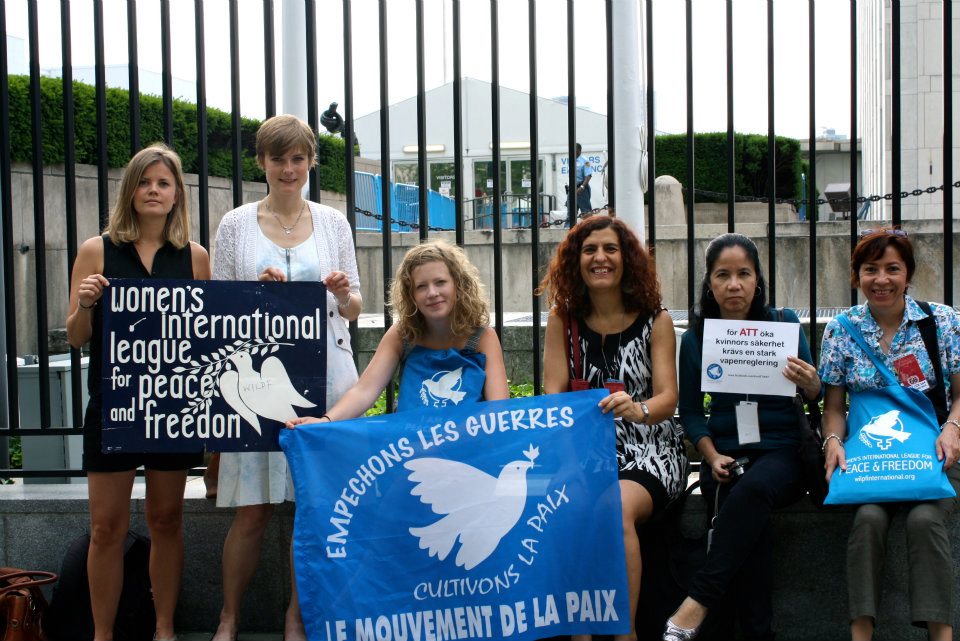Arms Trade Treaty Wrap-Up
 The Arms Trade Treaty negotiations took place July 2-27, 2012, at the United Nations Headquarters in New York City. WILPF members from several sections, including Sweden, Spain, Mexico, the Philippines and the United States, participated in training sessions, special events and advocacy.
The Arms Trade Treaty negotiations took place July 2-27, 2012, at the United Nations Headquarters in New York City. WILPF members from several sections, including Sweden, Spain, Mexico, the Philippines and the United States, participated in training sessions, special events and advocacy.
WILPF Events at the Arms Trade Treaty
Tuesday, July 10th (1:15 - 2:45): Madeleine Rees, WILPF Secretary-General and Jasmin, IANSA, briefed member states at the Mission of Canada.
WILPF Training Session, Wednesday July 11th: Five WILPF Sections (the Philippines, Spain, Mexico, the U.S. and Sweden) participated in a one-day training session that focused on enhancing the work on a national level concerning arms trade and military expenditure and coordinate such work with an international strategy. The training included discussions on how WILPF sections can work with these issues, the prioritization of aspects important to each section and the drawing up of plans for further national projects.
Gender and the ATT, Thursday, July 12th (1:15 - 2:30): A Side Event on Gender and the ATT was held at the Permanent Mission of Finland to the UN, with partners WILPF, Amnesty International and IANSA. The event was attended by more than 100 participants. Speakers addressed how the ATT could include specific gender criterion and thereby contribute to preventing gender-based violence. Madeleine Rees stressed that the ATT would be written within a legal framework of international law in which gender mainstreaming in the UN is already an obligation; thus, an ATT that does not take gender-based violence into account is not an option.
more than 100 participants. Speakers addressed how the ATT could include specific gender criterion and thereby contribute to preventing gender-based violence. Madeleine Rees stressed that the ATT would be written within a legal framework of international law in which gender mainstreaming in the UN is already an obligation; thus, an ATT that does not take gender-based violence into account is not an option.
Women's Human Rights, the ATT and CEDAW, Friday, July 20th (1:15 - 2:45): The event was hosted at UN Women headquarters, with partners IANSA, IAW, WILPF and UN Women. Its focus was how the ATTy and the Convention on the Elimination of All Forms of Discrimination against Women (CEDAW), along with the UN Security Council resolution 1325 et al. can work to prevent discrimination against women and gender-based violence (GBV), particularly in conflict and post-conflict situations.
Speakers included: Michèle Olga Pépé, IANSA Women's Network member and the West African Action Network on Small Arms (WAANSA) - Cote d'Ivoire, Pramila Patten, CEDAW Expert and Chair, Working Group on Women in Conflict and Post-Conflict Situations, Anne Marie Goetz, Chief Advisor, Peace and Security, UN Women, Nicole Ameline, Vice-Chair, CEDAW Committee and Expert. Vanessa Farr (pictured), international expert and consultant and WILPF member, spoke about the necessity for women's leadership in issues of disarmament. Additionally, Ray Acheson, Project Director of Reaching Critical Will, WILPF, provided an update of the ATT negotiations, detailing how the topic of gender had come to the forefront of the discussions that morning.
 Arms Trade Treaty Monitor: Civil Society Perspectives on the Arms Trade Treaty Negotiation Process
Arms Trade Treaty Monitor: Civil Society Perspectives on the Arms Trade Treaty Negotiation Process
30 July 2012, Vol. 5, No. 16
Editorial: A Pause for Reflection by Ray Acheson - Reaching Critical Will of WILPF
On Friday afternoon, the Arms Trade Treaty (ATT) negotiation conference closed without adopting a treaty. During the morning plenary, the United States, followed by Cuba, DPRK, Russia, and Venezuela, declared that negotiations needed to be extended. Thus the six year process to develop at ATT failed to achieve its goal. Furthermore, the draft treaty that would have been adopted was much weaker than the one envisaged by those who initiated the process in the first place. And so while this particular course has ended without a treaty, it is by no means the end of the road for an ATT altogether.
Continue reading Reaching Critical Will's most recent edition of the ATT Monitor.
Moving Forward: Is there recourse for the Arms Trade Treaty? Read more about this and the gender-based violence terms that were included in the final draft text.
